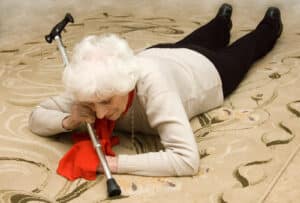
Falls are a leading cause of injury among seniors, and they significantly impact their health, independence, and quality of life. As our loved ones age, their risk of falling can increase due to factors such as reduced mobility, weakened muscles, and changes in vision or balance.
With proactive measures and careful planning by senior fall risk management professionals, these risks can be significantly reduced, whether the person is receiving in-home care or relying on support from a loved one.
We have put together six tips for managing the risk of falls for the senior in your care.
Tip #1: Conduct a Home Safety Assessment
A critical first step in fall prevention is conducting a thorough home safety assessment to identify and mitigate potential hazards. Senior fall risk management workers and family caregivers should look for trip hazards like loose rugs, cluttered walkways, and electrical cords.
Make sure that stairways are well-lit and equipped with sturdy handrails, and consider installing grab bars in key areas such as the bathroom.
For those relying on in-home care, professional caregivers can offer valuable insights into making the home safer and more accessible based on their experience.
Tip #2: Encourage Regular Physical Activity
Physical activity is vital for maintaining strength, flexibility, and balance, all of which can help reduce the risk of falls. Encourage your loved one to engage in exercises tailored to their ability level, focusing on activities that improve balance, such as Tai Chi or gentle yoga.
In-home care providers can facilitate safe exercise routines or accompany seniors on walks to ensure they stay active while minimizing the risk of injury.
Tip #3: Review and Manage Medications
Certain medications or combinations can increase the risk of falls due to side effects like dizziness or dehydration. Work with healthcare providers to review your loved one’s medications regularly, discussing potential side effects and any changes in their health that might affect how they metabolize medications.
Senior fall risk management professionals can help monitor for side effects and ensure that medications are taken as prescribed, providing an extra layer of oversight.
Tip #4: Optimize Lighting and Visibility
Poor lighting can significantly increase the risk of falls, particularly for seniors with vision impairments. Ensure that the home is well-lit, with easily accessible light switches and nightlights in hallways, bedrooms, and bathrooms.
Consider installing motion-sensor lights for added convenience and safety. Senior fall risk management caregivers can help identify areas where lighting improvements are needed and assist in making these changes.
Tip #5: Invest in Assistive Devices
Assistive devices, such as walkers, canes, and non-slip shoes, can provide valuable support for seniors at risk of falling. Work with senior fall risk management professionals to determine the most appropriate devices for your loved one’s needs and ensure they are properly fitted and used correctly.
Tip #6: Educate and Empower
Education plays a crucial role in fall prevention. Discuss the importance of senior fall risk management with your loved one, emphasizing the role they play in their safety.
Encourage them to speak up about any concerns or changes in their health that may increase their risk of falling. In-home caregivers can be invaluable educators, providing tips and strategies for fall prevention and ensuring that seniors feel empowered to take an active role in managing their risk.
Senior fall risk management requires a multifaceted approach, combining environmental modifications, physical activity, medication management, and education.
Whether your loved one is relying on professional in-home care or support from family members, these six tips can provide a solid foundation for reducing the risk of falls and promoting a safer, more secure living environment. By taking proactive steps to address fall risks, you can help ensure that your loved one remains healthy, independent, and confident in their ability to safely navigate their home and life.
If you or an aging loved one are considering Senior Fall Risk Management in San Francisco, CA, please contact the caring staff at Aviva In-Home Care today at (415) 463-1400
Aviva In-Home Care provides exceptional senior home care in the Bay Area, including San Francisco, Burlingame, San Mateo, Hillsborough, Atherton, Menlo Park, Palo Alto, Berkeley, Lafayette, Orinda, and surrounding areas.
- Keeping Seniors Properly Hydrated - June 6, 2025
- What You Should Know About Caring For A Parent With Alzheimer’s - May 23, 2025
- How To Help Your Senior Parent Feel Their Best Every Day - May 14, 2025




